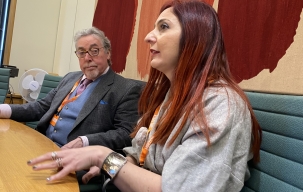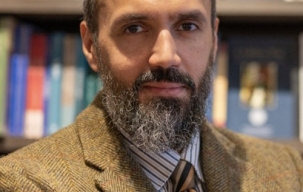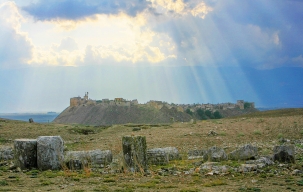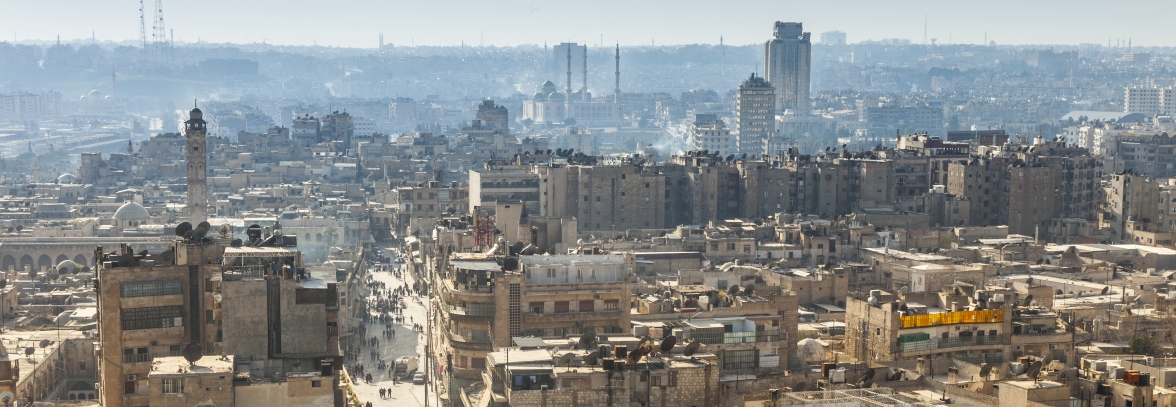Syria borders Turkey to its north, Iraq to its east and southeast, Jordan to its south and Israel (part of which is Israeli-occupied) and Lebanon to its southwest. Its capital is Damascus. Syria’s climate is mostly semi-dry desert. There are mountains in its west. Summers are hot and dry, with winters bringing rain and cooler climates. Syria possesses natural resources such as oil and other valuable metals and stones.
Almost 76% of the land is agricultural, with 25% being arable. In peacetime, Syria’s population distribution tends to be focused along the Mediterranean coast.
Population
Before the catastrophe of its its decade-long civil war, Syria was estimated to have a population of 19.4 million Syrians, with an extra 22,000 Israeli settlers in the Israeli-occupied Golan Heights. The population is now estimated at approximately 18 million but that excludes the approximately 5.5 million registered Syrians in neighbouring countries. Currently, Turkey hosts approximately 3.7 million refugees, while there are thought to be at least another in Lebanon.
Syria, like many of its Levantine neighbours, is ethnically diverse. Approximately 50% of the population is Arab, 15% Alawite (technically a Shia ethno-religious minority, although their beliefs can differ significantly from other mainstream branches of Shia Islam), 10% Kurd, 10% Levantine and 15% as other smaller minority groups including Druze, Ismaili, Assyrian and Armenians.
Government
The Syrian Arab Republic is a presidential republic. There are 14 administrative divisions. The latest constitution became effective in February of 2012. The Syrian legal system is a mixture of civil and sharia law.
The president is the chief of the state and head of government is the prime minister. Ministerial posts are appointed by the President.
It adopts the outward appearance of democracy with, for example, presidential elections. However, international scorn has greeted election results. In May 2021, when Bashar al-Assad, supposedly won his 4th successive term with more than 95% of the vote, the results were invariable described by western powers as "illegitimate" and "neither free nor fair". For all intents and purposes, Syria has been run by a family dictatorship for the last half a century.
As for the form of the elections themselves: elections to the office of president are by a popular simple majority vote. Terms last for 7 years and can be renewed once. The president will then appoint all other members of the executive.
The legislative in Syria is the People’s Assembly. These members are voted by simple majority on 4-year terms.
History
Modern day Syria has an ancient past, even though the borders of the modern state do not match those of the ancient state. The very name of Syria’s capital is an example of how ancient aspects of the country are. Damascus was referred to in Ancient Egyptian texts in 15 BC, although it is unsure what the original meaning was.
The modern state of Syria gained independence in 1946. Borders that cut across areas home various ethnic and religious groups started from the beginning a tense and unstable state in which to govern. In the 1970s, power fell to the Alawite clan in Syria in President Hafez al-Assad, whose main policy goals were promoting stability at home by consolidating his centralised power and winning back Syrian territory Israel occupied after 1967.
Keeping it in the family
In 2000, Hafez died and his son Bashar al-Assad became president. It's believed that Bashar was never intended to succeed. Bashar's older brother Bassel was being lined up for the succession, but he was killed in a car accident in 1994. Until then Bashar was in London training to be a consultant ophthalmologist. Following his brother's death, Bashar was recalled to Syria as heir apparent and enrolled into the country's military academy.
There were initial hopes that Bashar would loosen his family's authoritarian rule, but these were quickly dashed, particularly in the early stages of the so-called Arab Spring of 2011. The ensuing government crackdown on protests eventually led to one of the worst civil wars the world has witnessed for decades, resulting so far in the deaths of an estimated 500,000 people and the displacement of at least another 6.5 million Syrians. The regime ended on December 8th 2024 with the Assad's flight into exile to Russia.
Religion
The religious breakdown renders approximately 87% of the population as Muslim (including minority groups such as Shia, Alawi and Ismaili), 10% as Christian, 3% as Druze and a very few remaining Jews. The proportions of religious distribution, particularly of minorities, is likely to be skewed as a result of the ongoing conflict. Of the roughly 13% of Syrian Muslims that are Shia, 11% are Alawite, 1% Ismaili and around 0.5% Twelver Imami groups.
Fear over future religious tolerance
Syria’s cities are particularly known for their religious tolerance, having often been home to various religions for thousands of years. This tolerance has often led to different groups being able to apply their interpretations of family law on themselves, as well as being able to celebrate their own particular holidays.
However, there are very real fears that the current conflict might end this tradition of religious diversity in Syria, as religious minorities appear to have been disproportionately likely to have fled the violence. Accurate numbers around the religious breakdown in Syria remain hard to find, but many fear a less diverse state after peace is eventually restored to Syria.
Culture
Despite current tensions Syrians still pride themselves on their tolerant culture in their region. This has led to a various uniquely Syrian cultural phenomena. While the general cultural norms of Arab and Islamic culture might form a loos backdrop, a trip to any Syrian city will quickly demonstrate the huge complexity and history of the culture.
Syria contains some of the worlds most important buildings, including the Great Umayyad Mosque in Damascus, which dates back to the days of the very earliest Muslims. As an example of how traditions have merged in Syria for centuries, the mosque used to be a Byzantine church and before that a pre-Islamic temple.
Levantine styles of cooking dominate in Syria. Rich agricultural lands give the cooks across the country access to a wide variety of ingredients and dishes. Syrian cooking remains highly sought after in the Middle East and elsewhere.
Economy
The war has been a disaster not only for the people of Syria but also for its economy. GDP per capita in Syria was estimated at $2,900 in 2015. The impact of the conflict that started in 2011 on Syria’s economy is an estimated reduction of 70% in GDP, with both material and social results of the conflict and international sanctions crippling any hope of a stable economy.
Many Syrians now rely on multilateral international organsiations to assist them in various refugee camps or cities around the globe. Such countries include Turkey, Lebanon, Jordan and Germany, all of whom have accepted significant numbers of Syrian refugees as a result of the conflict.
Stable products of the Syrian economy normally include those from its farming sector (wheat and barley), textiles such as cotton and other agricultural goods. Industries include some petroleum, food and drink processing and some mining. Unemployment stands at an estimated 50%.
Civil war March 2011- December 2024
In March 2011, popular discontent with President Bashar al-Assad's Ba'athist government led to large-scale protests across Syria, as part of the wider so-called Arab Spring protests in the region. Numerous protests were violently suppressed by security forces in deadly crackdowns ordered by Assad. The suppression and subsequent conflict resulted in hundreds of thousands of deaths and detentions, many of whom were civilians. The revolution rapidly formed into insurgency leading to the formation of militias across the country. The revolt had developed into a full civil war by 2012. The Assad regime suddenly collapsed on December 8th 2024 with the flight of Bashar al-Assad and his family to Russia.
 Members content
Members content Members content
Members content Members content
Members content